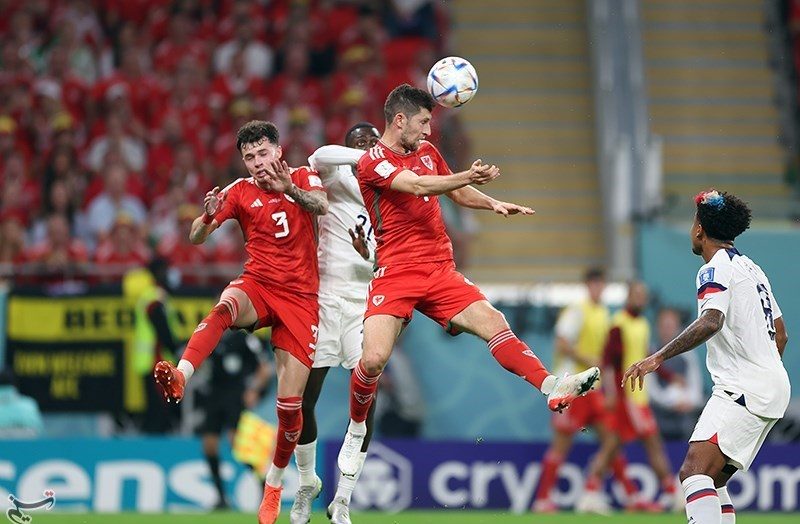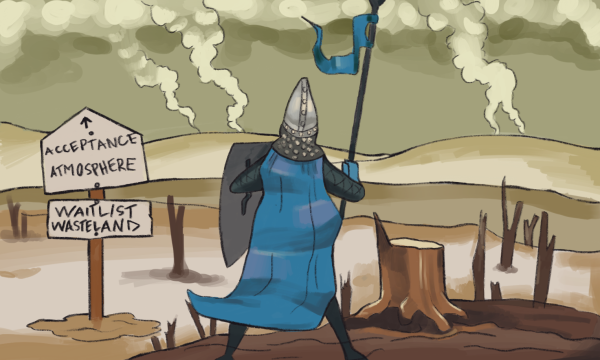Will this World Cup be remembered for the incredible soccer or avoidable controversy?
Courtesy of Hossein Zohrevand on Wikimedia
Will this World Cup be remembered for its remarkable match-ups or will it be remembered for the controversy surrounding it?
The World Cup always provides joy and entertainment to viewers around the world, and this year was no exception with Argentina claiming the title.
This was a historic accomplishment as Argentina hadn’t won in 36 years and legend Lionel Messi finally won the one title missing from his resume in what was supposed to be his last World Cup.
But given the shocking truths uncovered, a question arises: Will the 2022 FIFA World Cup be remembered for possibly the most memorable final in history – Argentina beat France 4-2 on penalties after the game ended in a 3-3 draw thanks to two goals from Messi and a hat trick from France star Kylian Mbappe – or will it be forever tarnished because of the controversy surrounding the host country Qatar?
In 2010, FIFA surprisingly announced the locations of both the 2018 (Russia) and 2022 World Cups (Qatar). Compared to past World Cup hosts, Qatar seemed like a questionable choice because of its controversial laws.
Many thought FIFA was bribed into giving hosting privileges to Qatar, considering Qatar is known as a wealthy country with many opportunities. One of the people who believed this was former FIFA media director Guido Tognoni.
“If you ask if FIFA can ever get away from corruption, you have to ask if the world can ever get away from corruption,” he said in the Netflix documentary, Planet FIFA.
These allegations of bribery were later proved to be true.
Sepp Blatter, the former President of FIFA, shone light on the issue many people had mixed opinions about. He said to the Swiss television station RTS reporter Tages Anzeiger, “Qatar is a mistake. The choice was bad.”
Even if many people suggested it wasn’t the best country to host the biggest international soccer tournament, the choice had been made and Qatar needed to start preparations immediately.
With absolutely no soccer history behind Qatar, the country was immediately a controversial pick. Qatar is a place with a little more than 3 million residents and is now hosting the biggest international event of the year. It’s estimated that at least 1.5 million people visited Qatar during the event, which is an overwhelming amount considering that’s about half of the country’s population. Viral videos and photos showed the lack of amenities fans experienced. With an extreme shortage of hotel rooms in areas near stadiums, fans had the option to stay in tents by the stadiums instead.
Qatar didn’t have stadiums fit for an event of this magnitude either, so the country hired an estimate of 6,500 migrant workers to build stadiums. The rushed construction caused many dangers.
In an interview with Piers Morgan, World Cup chief Hassan Al-thawadi shared how many fatalities the workplace had experienced.
“The estimates around 400, between 400 and 500,” he said.
These numbers were later published in the Los Angeles Times article, “Qatar Official: ‘Between 400 and 500’ Worker Deaths Tied to World Cup.”
Stories behind these deaths are still unknown as the Qatari government addressed these as “natural deaths.” If the migrant workers attempted to leave the nation while the construction was still in process, the government forbid them and forced them to work. Leading up to the World Cup, the schedule of the completion of the stadiums was unclear and there were concerns about when Qatar would actually be ready for the games to begin.
During the testing of one of the Qatar stadiums, there were some issues, such as a shortage of water, little to no air conditioning, and limited bathroom access. Furthering their drastic change toward soccer, Qatar is rumored to have flown soccer players from all around the world to come play for their national team. This was because FIFA requires that player must be born or lived in that country for a certain amount of time in order to represent the country in the tournament. This caused Qatar to act quickly and start looking for eligible players who had been born in Qatar.
Just as Qatar was ready to host the biggest soccer event of the year, new and old controversies were quickly brought to light. With pressure from the media, Qatar made this World Cup stand out more than it already had.
The World Cup, which is usually played during the summer months, was moved to the winter this year because of Qatar’s excessive heat during the summer. The location of Qatar near the Persian Gulf makes it incredibly hot during the summer, with temperatures generally exceeding 105 degrees.
For the first time ever the World Cup was to be moved to November because of weather.
On top of bribery allegations and controversial date and time changes, Qatar yet again surprised the public with their new set of rules for this year’s World Cup. One of their laws forbid LGBTQA+ relationships among the visitors and the players while in the country. Breaking this rule can lead to fines and up to seven years of prison.
“All the things they do to [the LGBTQ+ community] are in the shadows—nothing is public because they really care about how [the world] perceives them,” Dr. Naser Mohamed said in an interview with Time.
Mohamed is the first Qatari openly gay man, but he has lived in the US for the past 11 years.
Despite the law, many fans brought pride flags and demonstrated their support during the tournament. During the Portugal-Uruguay match on Nov. 28, a fan ran onto the field in protest during the game carrying a pride flag and wearing a shirt with the words “Save Ukraine,” on the front and then “Respect for Iranian Women,” in the back.
Security officers immediately sprung into action, trying to stop the protester. After catching them, they escorted them away in a matter of seconds. It is unclear what happened to the protester from there. FIFA did not address it.
In other attempts to protest the injustice against LGBTQ+ fans, players, and people in Qatar, seven European countries planned to wear the multicolor “One Love” armbands to show their support. But this was not allowed and the government stated that players who wore an armband would be given a red card and ejected from the game immediately. There was instant pushback.
It appears that this wasn’t the only rule that people disagreed heavily with. Dating and beer consumption were also banned from the event with many fans outraged by the situation. The day the World Cup started, Ecuador fans were heard chanting “We want beer,” after their team won against Qatar on Nov. 20.
But the day before, current FIFA president Gianni Infantino addressed the situation during a press conference.
“I don’t have to defend Qatar in any way whatsoever. They can defend themselves.” Infantino said. “I’m defending football here and injustice.”
This was before the World Cup, but after everything else that happened FIFA has remained almost silent in relation to the injustices and controversies that the event has brought with it.
The World Cup has always been an event looked forward to by the whole world with each country dreaming of bringing home the cup. But this year, fans found it harder to enjoy this international event because of the constant revelations of controversial secrets, changes, and rules. Thankfully in the end, soccer fans should have been highly satisfied with the play on the field and the final.
After 36 years of not winning, Argentina managed to take the trophy home for a third time. The soccer-crazed South American country had not won since 1986 when the famous Diego Maradona was leading his country on the pitch. Plus Messi finally added the cup to his stellar career.
Despite an amazing ending to the 2022 Fifa World Cup, will the world ever be able to overlook what FIFA and Qatar did?

Addison Jing is happy to be back for her third year on the Californian staff. This is the junior’s first year as a News Editor and she looks forward...









